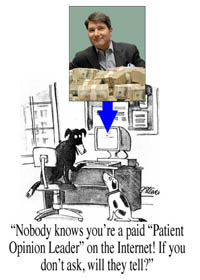Vol. 9, No. 9: NOVEMBER 2010 – EXECUTIVE SUMMARY
CONTENTS
- Up Front: Pharma Collaboration with Online Patient Opinion Leaders
- SURVEY: New Media Privacy Issues & Online Health Marketing
- Physician-Generated Content on Social Media Sites
- Getting Market Research Right in the Middle East
- Capturing & Reporting HCP-Related Meeting Spending
- New Lipitor Ads Dis Exercise & Healthy Diet. Are You Kidding Me?
- Certain Physician-Industry Relationships Have Declined Dramatically
- Guess What Site Online Health Info Seekers are NOT Visiting So Much
- EU to Release Data in December That Could Put Alli Diet Pill Sales in the Toilet!
- Detailing by Telephone Accounts for Nearly Half of “New Media” Promotion to Physicians
- WikiPharmaLeaks: TALES OF A PHARMA CEO
- Abbott Fetes Barred Cardiologist with High Cholesterol Pig Roast
- Are You Serious? A Good Example of Why Pharma Brand Managers “Love Its” TV
Up Front
Pharma Collaboration with Online Patient Opinion Leaders
 The pharmaceutical industry has a long tradition of working with individual patients and patient organizations. Currently, pharnaceutical marketers are talking about “stepping in” to join discussions patients are having online. In the near future pharma companies may hire influential online patients to act as “patient opinion leaders” (POLs) just as they have hired physicians to be key opinion leaders (KOLs).
The pharmaceutical industry has a long tradition of working with individual patients and patient organizations. Currently, pharnaceutical marketers are talking about “stepping in” to join discussions patients are having online. In the near future pharma companies may hire influential online patients to act as “patient opinion leaders” (POLs) just as they have hired physicians to be key opinion leaders (KOLs).
It’s time to determine the issues involving transparency and conflicts of interest that may arise if and when pharma companies pay individual POLs to help manage their engagement with patients online. What best practices should govern pharma’s collaboration with POLs? Should the industry develop guidelines for their interactions with POLs? This OpEd is a call for action and input from readers regarding these issues and questions.
Read on…this article is AVAILABLE NOW here:
www.news.pharma-mkting.com/PMNews_99_UpFront.pdf

Survey: New Media Privacy Issues & Online Health Marketing
This survey asks YOUR opinion about the privacy issues raised in a brief filed with the FTC regarding the online marketing practices of pharmaceutical and other health-related companies. Find more details about this survey here.
Thank you for your participation. Physician-Generated Content on Social Media Sites
DocCheck Survey of Its Members
 With over 710,000 users, DocCheck® is one of the most heavily subscribed medical portals in the world. Recently, Pharma Marketing News and DocCheck collaborated to survey members of the DocCheck online community.
With over 710,000 users, DocCheck® is one of the most heavily subscribed medical portals in the world. Recently, Pharma Marketing News and DocCheck collaborated to survey members of the DocCheck online community.
The goal of the study was to depict the usage of social media (online networks) within the target group of physicians. The influence and importance of social media as a modern channel of communication is growing constantly, also in the pharmaceutical sector. To date, there has been no study that focuses on the usage behavior of physicians on social networks. The present study aims at contributing to knowledge in this field.
Specifically, the following data were assessed: type of networks used, the frequency of posting, motivation for posting, estimation of network usage, relevance of content posted and an evaluation of the importance of online physician-generated content in the future.
Topic headings include:
- Paying Physicians for Content vs. Social Media
- About DocCheck
- Composition of Survey Sample and Demographics of Respondents
- Many Physicians Post Content
- Online Networks Used By German Doctors
- How Often & Why Do Doctors Post Medical Information?
- Doctors Find Online Information Useful
- Future of Social Media and Peer Review
Order and pay for this reprint now using your credit card…
ONLY $4.95Download PDF file immediately after paying:
Getting Market Research Right in the Middle East
A Land of Diversity, Opportunities and Unique Challenges
 This is the second in a series of three articles highlighting points made by Kantar Health executives in a recent webinar entitled “Getting It Right in the Emerging Markets: Identifying the opportunities and avoiding the pitfalls in conducting market research in new geographies.”
This is the second in a series of three articles highlighting points made by Kantar Health executives in a recent webinar entitled “Getting It Right in the Emerging Markets: Identifying the opportunities and avoiding the pitfalls in conducting market research in new geographies.”
If the Middle East was a single country, it would be the fifth largest market in the world in terms of GDP. The sales of pharmaceuticals in the Middle East surpasses $20 billion per year. That’s about equal to the UK Pharma market but unlike the UK, the Middle East is growing by 10 to 15% per year.
The Middle East is not only a land of demographic diversity, but also a land of diversity of health systems and also a land of opportunities. To succeed in this market, pharmaceutical companies must get the best possible market data, which is often difficult to do. In this article, Sherif Shafick, General Manager, Middle East and Africa for Kantar Health, provides some insights on the nature of pharmaceutical market in the Middle East and a case study on how these insights can help launch products.
Topic headings include:
- Importance of Emerging Markets
- The Middle East – A Land Of Diversity
- Individual Markets in the Middle East
- The Middle East – A Land Of Opportunities
- Unique Challenges
- Case Study: Bonding Emotionally with Physicians
Order and pay for this reprint now using your credit card…
ONLY $4.95Download PDF file immediately after paying:
Capturing & Reporting HCP-Related Meeting Spending
Let the Sun Shine In
 Life science companies are struggling to understand the complex reporting requirements and compliance issues presented by existing and new regulations such as the Sunshine Act, provisions of which were included in the Patient Protection and Affordable Care Act. These laws are putting the public spotlight on healthcare provider (HCP) meetings and meeting-related expenses.
Life science companies are struggling to understand the complex reporting requirements and compliance issues presented by existing and new regulations such as the Sunshine Act, provisions of which were included in the Patient Protection and Affordable Care Act. These laws are putting the public spotlight on healthcare provider (HCP) meetings and meeting-related expenses.
“There’s been a lot of public scru-tiny on meetings expeditures,” said Kevin Iwamoto, Vice President, Enterprise Strategy, StarCite. Iwamato was speaking at a recent webinar titled Capturing HCP-Related Meeting Spend Doesn’t Have to be Difficult, which was hosted by StarCite — a meetings management technology company. “There’s been scrutiny due to the PhRMA Code, the Sunshine Act, and new EMEA (European Medicines Agency) global codes,” said Iwamato. “All of these require life science companies to do strict tracking and monitoring of royalties, honorariums, speaker’s fees, entertainment and travel costs, etc.”
This article is a summary of the StarCite Webinar, which defined what pharma marketers and meeting planners need to know when it comes to meetings-related HCP reporting.
Topic headings include:
- How Much Does Pharma Spend on Meetings?
- Get Ready to Mitigate Your Risk
- PhRMA’s Code and State Laws
- Meeting and Event Spend per Attendee Break Down by Industry (chart)
- Review of the Physician Payment Sunshine Act
- Case Study: Millenium
- Integration with CRM Systems
Order and pay for this reprint now using your credit card…
ONLY $4.95Download PDF file immediately after paying:
Recent Posts to Pharma Marketing Blog by Pharmaguy
New Lipitor Ads Dis Exercise & Healthy Diet. Are You Kidding Me?
 In its most recent TV and print ads for Lipitor, Pfizer highlights a middle-aged man working out in a gym. In bold text and voice overs, the ad asks “Are You Kidding Yourself?” The print ad goes on to say “A lot of people think exercise and healthy diet are enough to lower cholesterol. For 2 out 3, it may not be.”
In its most recent TV and print ads for Lipitor, Pfizer highlights a middle-aged man working out in a gym. In bold text and voice overs, the ad asks “Are You Kidding Yourself?” The print ad goes on to say “A lot of people think exercise and healthy diet are enough to lower cholesterol. For 2 out 3, it may not be.”
This is the first time I have ever seen a DTC ad that so blatantly “disses” exercise and diet. At least, that’s what it sounds like to me.
Read more about this & tell me what you think: http://bit.ly/dalzUx
Certain Physician-Industry Relationships Have Declined Dramatically Over the Past 6 Years. Why?
According to a recent survey published in today’s issue of Archives of Internal Medicine, 83.8 percent of physicians reported some type of relationship with the drug industry during 2009. This included nearly two-thirds (63.8 percent) who received drug samples, 70.6 percent who received food and beverages, 18.3 percent who received reimbursements and 14.1 percent who received payments for professional services. This is despite a number of efforts over the past several years that were aimed at reducing or eliminating certain types of physician-industry relationships (PIRs).
There was a sharper drop in one type of PIR in contrast to others.
What’s the cause? Find out here: http://bit.ly/cOY2lB
Guess What Site Online Health Info Seekers are NOT Visiting So Much
The top line takeaway from the press release announcing Accenture’s new “Consumer Survey: The Evolving Consumer and The Pharmaceutical Company Relationship” is that only “slightly more than one in 10 (11 percent) [of consumers who go online for health information] regularly turn to a pharmaceutical company’s website to seek information about an illness or medical condition, compared to nine in 10 (92 percent) who look to other online resources more frequently.”
The press release alos says that the survey “demonstrates that the fundamental shift from a predominantly one-way company-to-patient dialogue to enabling a patient-to-patient – and even a patient-to-physician dialogue – through the evolution of social networks and online communities, has resulted in fragmentation.”
Guess what major Internet site is visited even LESS than drug.com sites by online health info seekers?
There’s a nice chart here: http://bit.ly/9QP8jR
EU to Release Data in December That Could Put Alli Diet Pill Sales in the Toilet!
 The European Medicines Agency (EMA) — Europe’s equivalent to the FDA in the U.S. — “will make thousands of pages of clinical trial reports public next week after pressure from drug-safety activists because of suicide risks linked to Sanofi-Aventis SA’s failed diet pill Acomplia.”
The European Medicines Agency (EMA) — Europe’s equivalent to the FDA in the U.S. — “will make thousands of pages of clinical trial reports public next week after pressure from drug-safety activists because of suicide risks linked to Sanofi-Aventis SA’s failed diet pill Acomplia.”
Also included will be data about orlistat, the active ingredient in Alli. Will the data impact Alli sales?
Read more about this here:
http://bit.ly/i5eEUf/dBZbEZ
Detailing by Telephone Accounts for Nearly Half of “New Media” Promotion to Physicians
According to an SK&A market research report, “Pharmaceutical companies are finding novel ways to promote their products to physicians and other prescribers, namely through new media channels such as internet detailing, tele-detailing, e-meetings and web advertising.” It’s interesting that the telephone (as in “tele-detailing”/”Telephone Detailing”) has been included as a “new media” channel.
“Tele-detailing” accounts for 49% of the new media channel physician promotional spend, whereas “Internet Detailing” is only 35% and Web advertising is a meager 1%.
How is that the telephone is considered a “new media” channel?”
Find the answer to that question, plus see more data on “new media” pharma marketing trends in this post: http://bit.ly/hm589N
WikiPharmaLeaks: TALES OF A PHARMA CEO
 A prominent Western businessman who is close to the CEO of Pfizer, Jeffrey bin Kindler. The businessman is known as a “fixer” for CEO bin Kindler. During their conversation, he recounted to the PG [PharmaGuy] a number of his interactions with the CEO bin Kindler.
A prominent Western businessman who is close to the CEO of Pfizer, Jeffrey bin Kindler. The businessman is known as a “fixer” for CEO bin Kindler. During their conversation, he recounted to the PG [PharmaGuy] a number of his interactions with the CEO bin Kindler.
Does this secret document have anything to do with Kindler’s recent decision to retire?
Read more here: http://bit.ly/i7AJRt
Abbott Fetes Barred Cardiologist with High Cholesterol Pig Roast
Practically every week I read amazing stories about stupid, immoral, unethical, or illegal activities perpetrated by the pharmaceutical industry. Stories that are bolstered with juicy quotes from internal corporate emails written by dumb executives. And I don’t have to wait for Wikileaks to publish this stuff when the U.S. Senate and the Wall Street Journal (WSJ) are already doing it!
Read the latest pharma email revelations here:
http://bit.ly/eW9LaD
Are You Serious? A Good Example of Why Pharma Brand Managers “Love Its” TV
Many pharma marketing experts wonder why pharmaceutical marketers spend approximately 70% of their DTC advertising budgets on expensive TV advertising when they might get better bang for their bucks advertising through other channels such as the Internet.
Whether or not you agree with that, there’s one indisputable factor about TV advertising to consider: the opportunity for brand managers to play at being directors, mingle with the stars, and even to have a “cameo” part in the production.
A good example of that is a disease awareness campaign called Are You Serious?TM, launched by JNJ’s wholly-owned Centocor Ortho Biotech division.
Read more about this here: http://bit.ly/hzv99f




![6 Digital Tools at the Center of Healthcare Digitalization [INFOGRAPHIC]](http://ec2-54-175-84-28.compute-1.amazonaws.com/pharma-mkting.com/wp-content/uploads/2021/04/6DigitalTools_600px-218x150.jpg)




![6 Digital Tools at the Center of Healthcare Digitalization [INFOGRAPHIC]](http://ec2-54-175-84-28.compute-1.amazonaws.com/pharma-mkting.com/wp-content/uploads/2021/04/6DigitalTools_600px-100x70.jpg)




